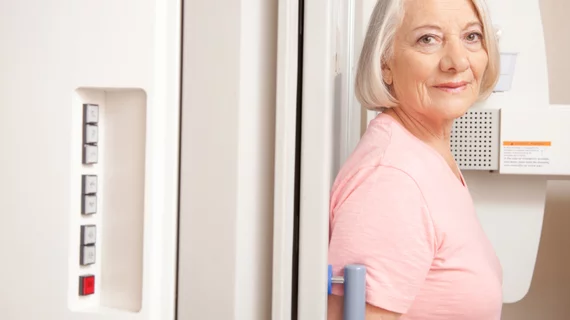Mammography AI intercepts density overestimations
Researchers have demonstrated a deep learning model that can correct course for breast radiologists who otherwise may have erroneously deemed tissue dense in screening exams.
In this way, they suggest, artificial intelligence can help head off unwarranted additional imaging, increase consistency among a practice’s readers and help each radiologist better estimate true cancer risk.
The work is described in a study published May 23 in JACR [1].
Brian Dontchos, MD, Constance Lehman, MD, PhD, and colleagues at Massachusetts General Hospital trained and tested their model using a convolutional neural network they fed around 59,000 random 2D mammograms from around 40,000 women.
They additionally trained the model to assess tissue density on evaluations by 12 academic breast radiologists ranging in reader experience from five to 33 years. The radiologists followed the American College of Radiology’s BI-RADS density categories—almost entirely fatty, scattered areas of fibroglandular density, heterogeneously dense and extremely dense.
The researchers tested their system on 85,000 consecutive screening mammograms and density assessments from an academic practice and a community practice over two time periods (with and without AI).
Also in the mix were assessments from a second community site that used no AI and so served as the control.
Using the academic radiologist reads as ground truth assessments, the team found both AI sites saw a significant reduction in dense mammogram counts. They also noted reduced variability in density assessments at these sites.
Meanwhile the control site saw the proportion of dense to non-dense mammograms increasing over time.
“[O]ur deep learning model reduces the proportion of screening mammograms categorized as dense and could reduce unnecessary supplemental imaging and better inform traditional risk models that rely on breast density to estimate breast cancer risk,” Dontchos et al. comment in their discussion. “More widespread use of our deep learning model should be considered as this tool could supply more consistent information to patients and help healthcare systems more appropriately use limited supplemental screening and risk assessment resources.”
More:
Clinical implementation and evaluation of deep learning models in routine clinical use is an important step in developing artificial intelligence algorithms for radiology.”
More Coverage of AI in Breast Imaging:
10 clues suggest scope, shape of AI’s future in mammography
Malignant architectural distortion ably diagnosed on breast imaging by human-AI combo
Pairing ultrasound with artificial intelligence reduces unnecessary breast biopsies
Radiologist nabs $4.5M grant to eradicate human limitations of mammography reading
AI can triage screening mammograms, save radiologists time
Reference:
- Brian Dontchos, Katherine Cavallo-Hom, Leslie Lamb, Sarah Mercaldo, Martin Eklund, Pragya Dang, Constance Lehman: “Impact of a Deep Learning Model for Predicting Mammographic Breast Density in Routine Clinical Practice.” Journal of the American College of Radiology, May 23, 2022. DOI: https://doi.org/10.1016/j.jacr.2022.04.001

